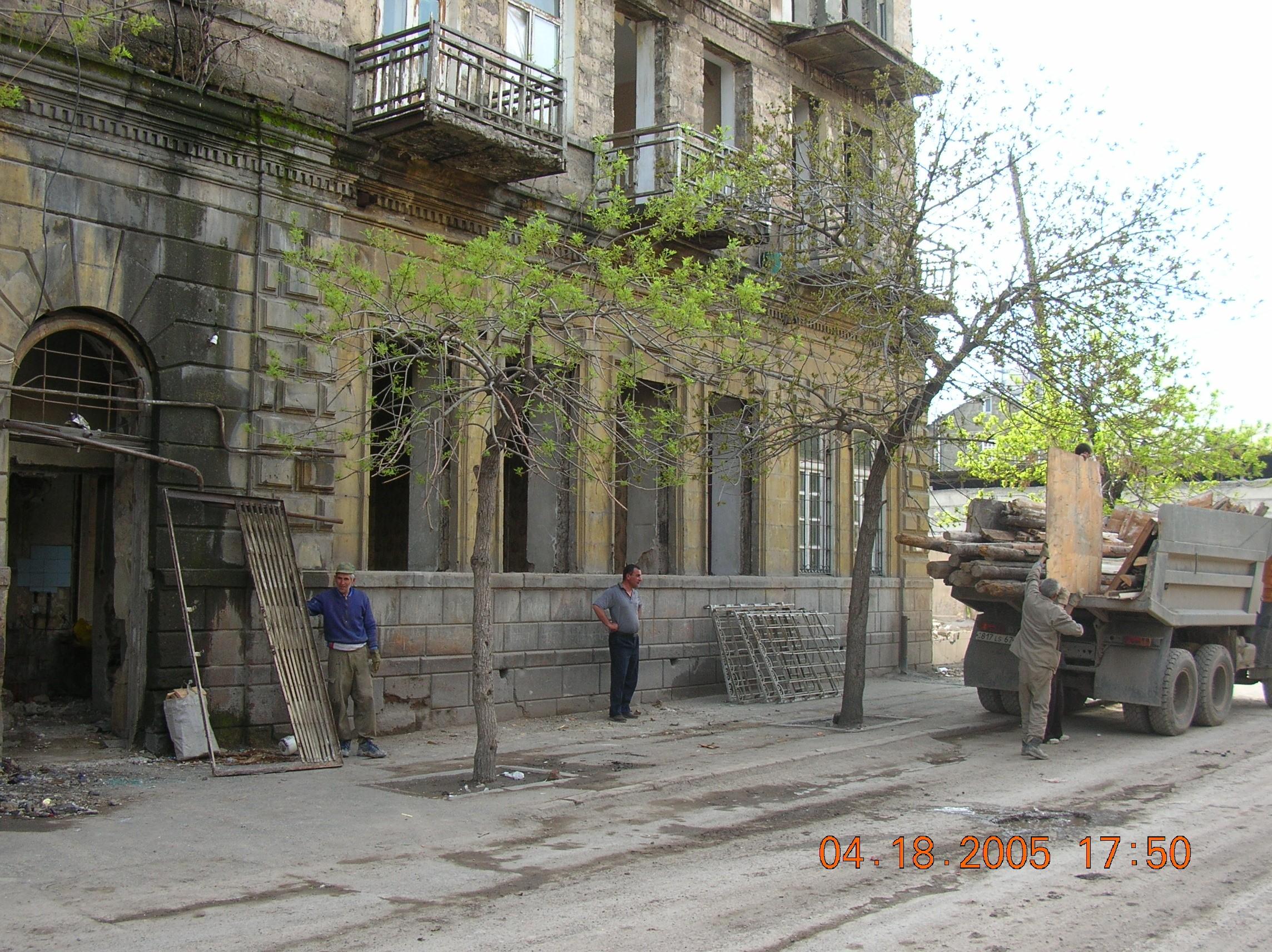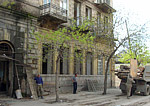
Ghasabyan Family: Evicted From Yerevan Home; Seeking Justice from European Court
 Little Daniel should have celebrated his first birthday on July 7, 2005. However, on that special day, his mom didn’t bake a birthday cake, no guests arrived and no one paid the wee boy any special attention. Daniel couldn’t understand why his parents were so sad on his birthday and why Grandpa Levon was on the verge of tears.
Little Daniel should have celebrated his first birthday on July 7, 2005. However, on that special day, his mom didn’t bake a birthday cake, no guests arrived and no one paid the wee boy any special attention. Daniel couldn’t understand why his parents were so sad on his birthday and why Grandpa Levon was on the verge of tears.
On that day, bailiffs from the Compulsory Enforcement Service (CES) came to pay little Daniel’s family a “visit”. They came to evict the Ghasabyan family. “We knew that they were coming so we moved out some belongings in advance. The CES guys carted off the rest,” recounts Daniel’s aunt Gohar, “They started to rip the place apart that day. They removed the windows and pulled up the floor. Our house wasn’t in the best of shape but it was our own. It was tough watching how they tore the house apart right in front of you. It really crushed my father who lived in that house for 60 years.” The building at 25 Buzant Street appeared in a list of property to be “appropriated for state usage”. The house was built in 1939 by Levon Ghasabyan’s grandparents, along with some neighbors. There was a large balcony on each of the three floors and the second floor apartments had basements. Gohar Ghasabyan, her brother’s family and her father, Levon Ghasabyan, all lived in Apt 1 at 25 Buzant Street.
Independent appraisers feared retribution 
“We were never opposed to a new building going up on the site of our house, but it all should have been done according to the law and with a degree of courtesy. But they were “bean-counters” and saw everything purely in dollars and cents. They evaluated our house at $300 per square meter and offered us just over $23,000. Independent appraisers would simply refuse to touch property in the seizure zone since they were afraid of losing their jobs. They told me this outright,” recounts 28 year-old Gohar. When calculating the compensation allowances, the contractor considered the basements of the second floor apartments to be illegal construction and the residents didn’t get anything for them. The contractor also didn’t take into account general sites that the residents also erected. “They would offer you a bonus as an incentive to sign the contract within 5 days. Some signed and took the bonus money. They didn’t want to pass it up since the contractor, “Griar” told us that if we didn’t voluntarily sign, they would force us to,” she explains. The Ghasabyan family never entered into an agreement with the contractor, but they nevertheless were forced out in return for $23,000 by a court order. “Our court proceedings were rushed through and our petitions were rejected by all. Even one of the judges agreed that we were in the right but confessed that his hands were tied. ‘If I find in your favor will you take care of my children?’ Gohar remembers the judge asking. “We decided to take the matter to the European Court and we wasted no time getting our papers in order.” After being evicted, the Ghasabyan’s lived in rented apartments for many years since they couldn’t find anything suitable to purchase for just $23,000. At first they were paying 80,000 AMD in rent and then 120,000. “We incurred some losses by renting a place to live. Oftentimes, we paid the rent out of the $23,000 compensation money. Now, my brother and his family live with the wife’s parents and we’ve moved in with our other brother,” Gohar says.
3 years of futile protest
Almost every Thursday for the three years, the Ghasabyan family staged a protest outside the Government Building in downtown Yerevan. During that time, prime ministers and presidents came and went, but the situation of these evicted families remained the same. “All the officials that came to speak to us promised a solution to our plight. We really didn’t take them at their word but, at the beginning, we held out a ray of hope. In the end, nothing happened,” Gohar says, evidently disappointed by the inaction of the government. The European Court of Human Rights afforded the RoA government the opportunity of negotiating with the Ghasabyan family. “We were ready to enter into negotiations with the government and reach some agreement but what they offered wasn’t adequate. And they rejected what we put on the table. For example, the government offered us some property that we would take title to in 2010. It located in building that’s supposed to be built not some 200 meters away from our old house. However, construction on the building has yet to start. Imagine if we agreed to this offer – the European Court would have closed the case, we wouldn’t have gotten the apartment a nd we’d be forced to apply to the Court once again and wait another five years for a verdict. We no longer have any confidence in our government. That’s why we didn’t accept their latest offer,” says Gohar. The government made another offer to the Ghasabyan’s which the family also rejected. Gohar said it was even worse than the first offer. In their application to the European Court of Human Rights, the Ghasabyan family didn’t state a specific compensation amount they were demanding. “We are ready to accept an amount from the government reflecting the true value of the house, which is $400,000. We informed the European Court of this but failed to note a specific compensation amount, since that is something for the Court itself to decide,” says Gohar Ghasabyan. The case of “Ghasabyan v. the Republic of Armenia” is winding up and the European Court will declare its verdict in the near future. It’s not normal for citizens of the RoA to have to take their problems to a foreign court to receive fair adjudication. Sadly, there is no alternative at the present time. “I really love Armenia and long for the day when it becomes a country where the rights of citizens are respected, the laws work, and people aren’t thrown out of their homes by the very government sworn to protect them. For this to happen, we must show that they are in the wrong. These decisions of the European Court will hopefully make the government think twice and mend their ways so that it performs a positive, not negative role, in the lives of the nation’s citizens,” argues Gohar. Little Daniel has since turned five and goes to school. The little boy’s family still faces the unresolved compensation issue. “We are sure that the European Court will pass a just sentence on our behalf. It’s just that it’s been hard to have to wait five years for justice to be done,” say’s the boy’s aunt Gohar.
 Videos
Videos Photos
Photos
Write a comment